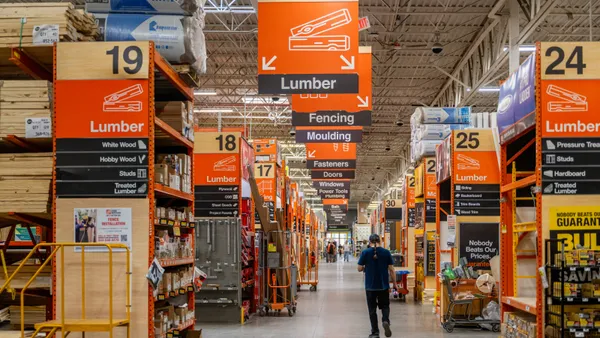Dive Brief:
- The footwear industry has come out against the latest list of proposed tariffs, asking in a letter to President Donald Trump for footwear to be taken off the list and calling the duties "catastrophic" for the industry. More than 170 brands, including Nike, Adidas, Aldo, Under Armour and Reebok, signed the letter, which was shared yesterday by the Footwear Distributors and Retailers of America (FDRA).
- "As an industry that faces a $3 billion duty bill every year, we can assure you that any increase in the cost of importing shoes has a direct impact on the American footwear consumer," the letter reads. "It is an unavoidable fact that as prices go up at the border due to transportation costs, labor rate increases, or additional duties, the consumer pays more for the product."
- The U.S. imported more than $11.4 billion in footwear from China in 2018, according to the Census Bureau. This number has been declining every year from a peak of $14.4 billion in 2012.
Dive Insight:
The letter from the footwear industry acknowledged one piece of advice often given to companies facing tariff pressure: just move. Companies have already started moving to other Southeast Asian countries like Vietnam where Adidas has up to 44% of its shoe production. Nike's China operation has slowed down in recent years with the country making 32% of the company's shoes in 2012 down to 19% in 2017, according to GQ.
But avoiding tariffs isn't as simple as just continuing down this road, the letter said.
"While our industry has been moving away from China for some time now, footwear is a very capital-intensive industry, with years of planning required to make sourcing decisions, and companies cannot simply move factories to adjust to these changes," the letter reads.
The letter also emphasizes consumers will shoulder the cost of the fourth round of tariffs, with companies inevitably passing it along to the final buyer. FDRA estimates the cost of the latest list to consumers would result in $7 billion in additional costs annually.
Linda Lim, a professor of corporate strategy and international business at the University of Michigan, recently referred to the latest list of proposed tariffs as the "Walmart stuff" on which everyday consumers are more likely to notice higher prices.
The long-term impact could result in billions in sales and thousands of stores being put at risk, according to research by UBS cited by USA Today.
"We think potential 25% tariffs on Chinese imports could accelerate pressure on these company’s profit margins to the point where major store closures become a real possibility," UBS wrote according to USA Today.














